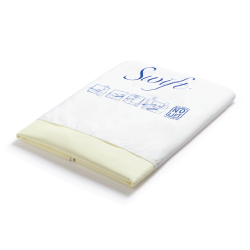
Why the Swift® In-Bed Repositioning System Outperforms WendyLett Systems
When it comes to in-bed repositioning systems, the Swift® In-Bed Repositioning System by MIP offers several advantages over WendyLett systems, particularly in terms of COST, functionality, ease of use, and patient comfort.
Key Advantages of the Swift® System
1. Cost: A full swift system from MIP will cost you around £55-£100 where as a full WendyLett system can cost anywhere between £200-£250
Integrated Design for
Continuous Use:
The Swift® system uses a low-friction UltraSlide® Bottom Sheet combined with Swift® Sliders, which remain in
place under the patient without negatively impacting mattress performance.
This allows for seamless repositioning while ensuring that the system is
always ready for use. WendyLett systems typically require repositioning
the sheets before use, making Swift® more efficient for caregivers
managing multiple patients
3. Better Compatibility with Specialised Mattresses: Swift®’s ultra-thin design is compatible with pressure-relieving mattresses, ensuring there’s no compromise in pressure redistribution or heat buildup. This makes it particularly suited for patients at high risk of pressure injuries, an area where WendyLett systems may pose limitations due to their thicker, multi-layered design
Versatility for All
Dependency Levels: The Swift® system accommodates both
dependent patients who require full assistance and those who retain some
mobility. Its stretch fabric and low-friction panel even allow
semi-independent patients to reposition themselves, offering greater
flexibility compared to WendyLett, which is generally optimised for more
dependent individuals
Enhanced Aesthetics and
Comfort:
Swift® Sliders mimic the appearance of standard bedding and can be
discreetly tucked away when not in use. This ensures a dignified
experience for patients while maintaining a clean, professional look in
care environments. WendyLett systems often lack this visual appeal and may
appear more clinical, which can impact patient comfort and dignity
Ease of Handling for
Caregivers:
The lightweight and low-friction properties of the Swift® system
significantly reduce caregiver strain during repositioning tasks. In
contrast, WendyLett’s multi-layered configurations may demand more effort
and are less intuitive for some movements
Durability and Maintenance: The washable Swift®
components are designed for repeated use without compromising performance.
With its integrated design and high-quality materials, the system retains
functionality even after extended use, making it more cost-effective over
time compared to WendyLett systems, which may require more frequent
replacements
Conclusion
The
Swift® In-Bed Repositioning System outshines WendyLett systems by providing a
more versatile, patient-friendly, and caregiver-efficient solution. It ensures
a balance between maintaining patient dignity, supporting specialized
healthcare needs, and simplifying caregiver workloads. For healthcare
providers, Swift® offers a more innovative, long-term option for managing
patient repositioning effectively.

